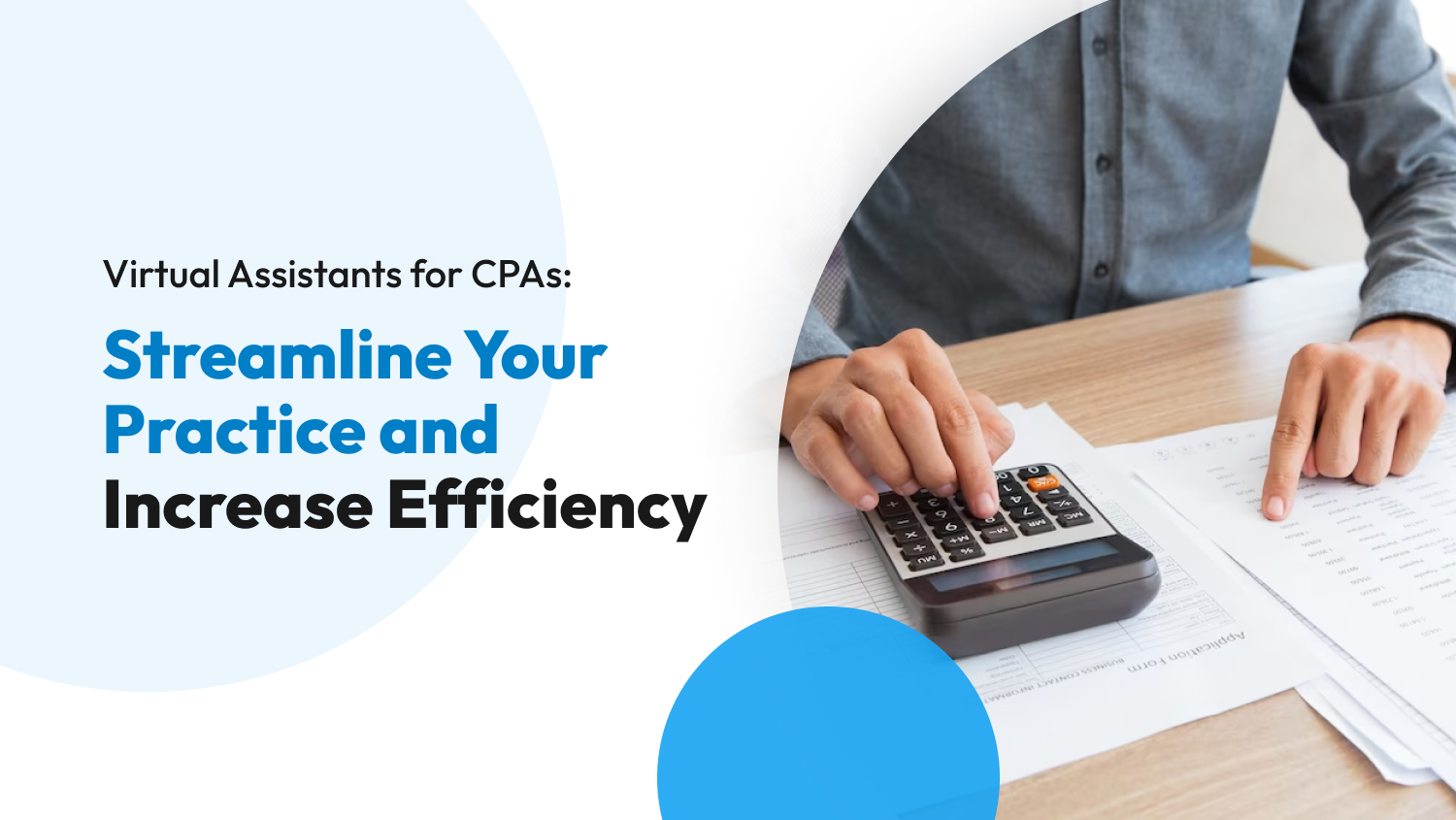People
Virtual Assistants for CPAs: Streamline Your Practice and Increase Efficiency
Virtual assistants can be especially helpful for small accounting firms or solo practitioners who may not have the resources to hire full-time staff. By outsourcing administrative tasks to a virtual assistant, CPAs can save time and money while still providing high-quality service to their clients.
CPAs have to wear different hats to keep their businesses running. Your time may be spent on documenting clients’ financial transactions, resolving discrepancies, and advising them on financial problems. These still don’t include the tasks you’ll have during tax season.
Virtual assistants are a godsend for CPAs as they’re skilled and experienced in accounting and can complete certain tasks on your behalf. When you have one working for you and your firm, you can allocate your resources to more significant activities while still being able to complete menial tasks.
What is a Virtual Assistant?
A virtual assistant or VA completes a variety of administrative tasks remotely. Known as remote personal assistants, they’re often hired by business owners who want to offload repetitive tasks.
Virtual assistants can work independently or as part of a team and typically communicate with clients using various online tools, like video conferencing, chat, email, or project management software. They’re often self-employed and charge their clients per hour or per project or set a fixed rate per month.
How Can CPAs Benefit from a Virtual Assistant?
Virtual assistants are no longer new. In fact, the virtual assistant market is booming, with a 41% increase in 2020. But even with the popularity of virtual assistants, some CPAs are still hesitant to hire one. If you’re one of them, consider the list of benefits VAs can provide to you and your practice:
Flexibility
Virtual assistants for CPAs can work full-time, part-time, or per project, meaning you can adjust their workload as needed. Do you need help with a month’s worth of backlog? Ask your virtual assistant to work 40 hours a week. Is the tax season almost over? Reduce the number of hours your virtual assistant has to work.
Affordability
Virtual assistants for CPAs are more affordable than hiring an in-house employee. Virtual assistants don’t need office space or equipment as they’re working remotely and provide their own equipment. They’re also independent contractors responsible for paying their own taxes, benefits, and insurance, which means that you don’t have to pay these for them.
Most importantly, when you hire a virtual assistant, you’ll only pay for the services you need. You won’t have to pay them when they’re idle or don’t have any projects to accomplish.
Frees up Your Time
As a CPA, you probably have too many things on your plate that you no longer have time to complete menial or repetitive tasks. By delegating tasks to a virtual assistant, you can free up your time and focus on revenue-generating activities and achieve a work-life balance.

Streamlining What VAs Can and Can’t Do
Without a doubt, virtual assistants can make any CPA’s life easier. However, because CPAs often work with sensitive and confidential financial information, it’s important to determine the tasks virtual assistants can and can’t do. This prevents any hiccups and ensures that the partnership you build with a virtual assistant leads to productivity and efficiency.
A VA can:
Curious about what tasks a virtual assistant can do for your practice? Listed below are tasks that you can offload to them.
Ensure Bills Are Paid on Time
A virtual assistant can make paying bills as hassle-free as possible. They’re trained and experienced in performing different accounting functions, like bill payment and payment collection.
Vendor bills and other payables can accumulate into a large pile, which is why it’s important to generate timely payments. Otherwise, delayed bill payments might lead to the disinterest of vendors, causing them to abandon your practice and choose your competitors.
Fortunately, a virtual assistant can set reminders and make direct payments that don’t require your intervention. This results in better relationships with your vendors.
Prepare Balance Sheets and Profit and Loss Statements
As a CPA, you know the importance of financial documents, such as balance sheets, profit and loss statements, and trial balances. These are essential to ensure that your practice runs smoothly.
A virtual assistant can create and archive these documents for you so they’re available for use or examination. Once these documents are prepared, creating yearly financial statements for tax rebates can become a breeze.
Prepare Invoices
Your practice needs to issue invoices. It’s legal proof that you sold services to a client. Unfortunately, preparing invoices is time-consuming, which is why many CPAs who run their own practice need someone else to complete this task for them.
A virtual assistant can solve this problem as they can handle invoice preparation for your firm. They’re knowledgeable in various invoice tools and can create invoices fast.
Prepare General Ledgers
Preparing general ledgers can save you the hassles of running through countless receipts to identify and record revenue. General ledgers also record your expenses — an essential document that you can use to determine your spending.
Every transaction is recorded in a general ledger, saving you time, effort, and the risk of losing money. However, ledgers take time to prepare as they require a lot of details.
Thanks to virtual assistants, you don’t have to change your routine just to update or prepare your firm’s general ledger. They have in-depth experience in completing this task. Virtual assistants who have been working for CPAs for years might even have certain strategies for preparing general ledgers that don’t require as much time.
Mail Important Documents and Invoices to Clients
CPAs who manage their practice must focus on providing their clients with the best services and can leave the rest to virtual assistants. Your virtual assistant can send invoices to clients to ensure timely payments and send important documents to your clients.
Imagine if you have to do these clerical tasks — who else will create and implement complex business strategies for your practice? This is the reason why it’s best to delegate tasks to a virtual assistant.
Follow-up With Clients
There are instances when you need to follow up with clients on the phone. For instance, you might want to clarify some questions or concerns about a client’s financial record or ensure you fully understand the records they’ve presented or sent.
When your clientele is smaller, following up doesn’t seem too much of a burden. But when your practice has grown, this activity can become extremely hectic and stressful. A virtual assistant can follow up with clients and ensure that both parties are on the same page. Your virtual assistant’s ability to communicate with clients regularly also helps foster professional relationships and retain clients.
Maintain and Update Financial Data
For your practice to run smoothly all year round, it’s crucial to have an updated and accurate record of your client’s finances. You should also keep a record of your firm’s finances to easily track the growth of your practice.
Data entry is a task a virtual assistant can help you with. They can input financial data into the software of your choice and update it regularly. They can record it in a format that’s easy to understand and analyze.
A VA can’t:
The help a virtual assistant can provide is beneficial for CPAs in a number of ways. But keep in mind that they’re only there to “assist” you, not replace your role as a CPA. Listed below are tasks a virtual assistant for CPA can’t perform:
Give Legal Advice Regarding Finances
Your virtual assistant might be exemplary in preparing and evaluating financial reports, but you shouldn’t allow them to give any legal advice to clients. Inform your virtual assistant about this limitation before they start working for you.
Additionally, encourage your clients to direct all of their legal- and financial-related concerns to you. Let them know that your virtual assistant isn’t your replacement.
Complete Tax-Related Tasks
It’s common for virtual assistants to be great at crunching numbers, but they’re not qualified to handle clients’ taxes officially. It’s best to complete all tax-related tasks for your clients yourself rather than letting a virtual assistant do it.
Not filing taxes on time and failure to submit the necessary documents have consequences, ranging from civil and criminal penalties to delayed refunds. You don’t want your clients to experience any of these just because you let your virtual assistant take over, right?
Make Big Business Decisions
Experienced virtual assistants are well-versed in different areas of accounting — they might even analyze records and give pieces of advice to clients. But when it comes to big business decisions, make sure your clients rely on what you have to say over your virtual assistants.
CPAs provide a more detailed review and analysis of financial reports that help clients see the bigger picture. Your credentials are synonymous with high-level thinking and sound advice — traits that’ll help your clients make big business decisions.
Set Limitations With Your VA
Hiring a virtual assistant can provide countless benefits to your practice. But since your profession deals with clients’ confidential information, it’s crucial to determine which tasks you should and shouldn’t give to your virtual assistant. This way, your firm avoids lawsuits, and you’ll maintain your credibility as a CPA.
Disclaimer: The information provided in the article is not intended for legal advice, financial advice, or any other advice of a professional nature. Always consult a legal or financial professional before making any professional decisions.












